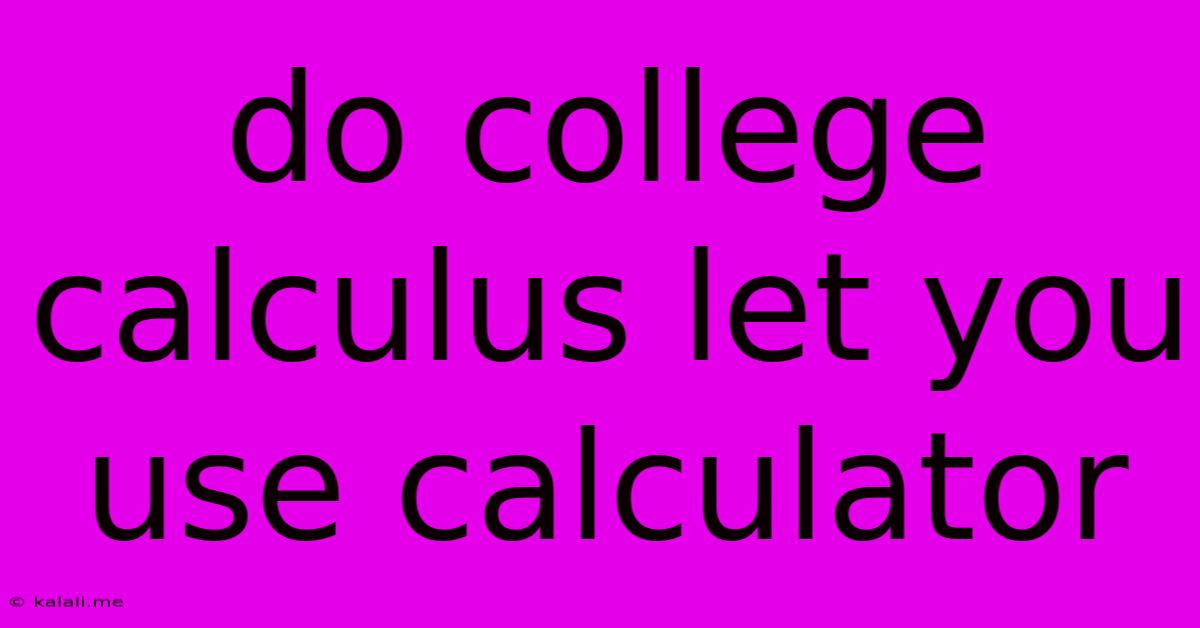Do College Calculus Let You Use Calculator
Kalali
Jun 10, 2025 · 3 min read

Table of Contents
Do College Calculus Classes Let You Use a Calculator? The Complete Guide
Meta Description: Wondering if you can use a calculator in college calculus? This guide clarifies calculator policies, explores the types allowed, and discusses why certain calculators might be banned. We also delve into the importance of understanding the underlying concepts, regardless of calculator usage.
College calculus can be daunting, and one of the first questions many students have is regarding calculator usage. The short answer is: it depends. While some aspects of calculus involve computations easily handled by a calculator, the use of calculators in college calculus classes is often restricted, or at least heavily regulated. This article will break down the nuances of calculator policies in college calculus, explaining why restrictions are in place and what you should expect.
Why the Restrictions on Calculators in College Calculus?
The primary reason for limiting calculator use in college calculus boils down to pedagogy. The core goal of calculus isn't just to produce numerical answers; it's to foster a deep understanding of mathematical concepts, problem-solving strategies, and analytical skills. Over-reliance on calculators can hinder this crucial development.
Here's a breakdown of the pedagogical reasons:
- Understanding the Fundamentals: Calculators can mask a lack of understanding of fundamental concepts. If you can't solve a derivative or integral by hand, simply plugging numbers into a calculator won't help you grasp the underlying mathematical processes.
- Developing Problem-Solving Skills: Calculus problems often require a multi-step approach. A calculator can only perform individual calculations; it can't strategize or break down complex problems into manageable parts.
- Preventing Errors and Building Intuition: Calculators can sometimes produce inaccurate results, especially with complex inputs or improperly entered data. Knowing how to perform calculations manually helps build mathematical intuition and allows you to identify potential errors more easily.
- Preparing for Advanced Courses: A strong foundation in manual calculus is crucial for success in more advanced mathematical and scientific courses. These advanced courses may require a deeper understanding of mathematical processes that a calculator cannot provide.
What Types of Calculators are Allowed (or Not)?
While many professors prohibit graphing calculators completely, some might allow basic scientific calculators. The specifics vary widely between professors, institutions, and even individual courses. Always check your syllabus or directly ask your professor for clarification.
Here's a general guideline:
- Generally Allowed (but often with limitations): Basic scientific calculators capable of performing arithmetic operations, trigonometric functions, logarithms, and exponentials.
- Generally Not Allowed: Graphing calculators (like TI-84, TI-89, Casio fx-9860GII), programmable calculators, and calculators with computer algebra systems (CAS) like the TI-Nspire CAS. These calculators can perform symbolic calculations, essentially solving problems for you instead of requiring you to demonstrate your understanding.
How to Succeed in College Calculus Without Over-Reliance on Calculators
The key to success in college calculus lies in a balanced approach. While calculators can assist with certain computations, focusing on understanding the underlying principles is paramount.
Here are some effective strategies:
- Master the Fundamentals: Prioritize understanding the core concepts of limits, derivatives, integrals, and their applications. Practice solving problems by hand until you're comfortable with the process.
- Use Calculators Strategically: Utilize calculators for time-consuming calculations (like evaluating definite integrals with complicated numbers) after you've solved the problem using appropriate methods.
- Practice Regularly: Consistent practice is crucial for mastering calculus. Work through a variety of problems, paying attention to the reasoning behind each step.
- Seek Help When Needed: Don't hesitate to ask your professor, teaching assistant, or classmates for help if you're struggling with any concepts or problems.
In conclusion, while the use of calculators in college calculus is often restricted, their strategic use can be helpful after you have a strong grasp of the fundamentals. Your professor’s guidelines are paramount, so always consult your syllabus and ask questions to ensure you're prepared for exams and assignments. The focus should always remain on developing a deep understanding of the subject matter, not just obtaining numerical answers.
Latest Posts
Latest Posts
-
How To Know If My Transmission Is Slipping
Jun 10, 2025
-
Prove The Square Root Of 5 Is Irrational
Jun 10, 2025
-
How To Dispose Of Razor Blades
Jun 10, 2025
-
How Long Does It Take To Do A Alignment
Jun 10, 2025
-
How To Turn Off The Check Engine Light
Jun 10, 2025
Related Post
Thank you for visiting our website which covers about Do College Calculus Let You Use Calculator . We hope the information provided has been useful to you. Feel free to contact us if you have any questions or need further assistance. See you next time and don't miss to bookmark.